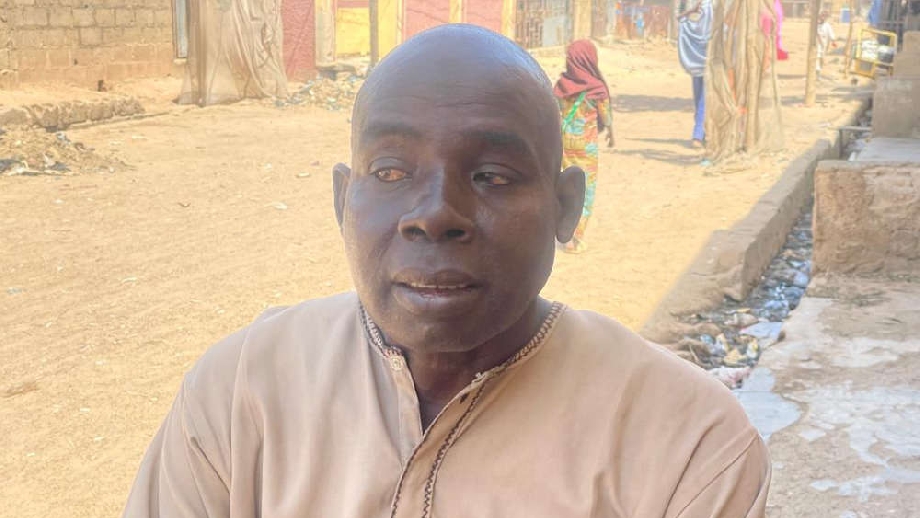
In the Rimin Kebe community, in Ungogo Local Government Area of Kano State, a public school teacher, Sa’idu Muhammad, sits outside his house, struggling to remember simple things.
Diagnosed with Type diabetes five years ago, Sa’idu says the disease has now affected his brain.
"I can no longer handle the physical and mental stress that comes with diabetes,” he says.
At Kofar Ruwa Market in Dala LGA, 55-year-old Ibrahim Aliyu manages a public toilet. But hidden behind his counter is a big wound on his right leg.
He has lived with it for more than 20 years.
Ibrahim says he has spent millions treating the wound, but it refuses to heal. He now depends on local herbs because he cannot afford drugs anymore.
“I have spent millions treating this, but nothing seems to change,” he says, pulling up his trousers to show the wound.
"Now I use local herbs because I cannot afford drugs anymore,” he adds.
Still in Rimin Kebe, another victim, Abdul Musa, shows the emotional and financial cost of the disease.
Musa used to weigh 120 kilograms, strong and lively. Today, he weighs 75 kilograms, his bones more visible, his steps slower.
“I sold almost everything I had,” he says. “All because I wanted to stay alive.”
Every week, he struggles to buy insulin. Every month, he battles rising sugar levels. He fears what tomorrow might bring.
In the Brigade area, in Nasarawa LGA in Kano, Usman Haruna fights a different kind of battle. Diagnosed with diabetes in 2016, Usman says the disease has turned his body against him.
“When my sugar level goes high, I cannot stand or walk,” he explains. “I feel helpless. My body becomes like rubber.”
His neighbours often rush him to the nearest clinic whenever he collapses. He has lost so much weight that even people who knew him years ago hardly recognise him now.
These individual struggles are not isolated. They reflect a larger, more frightening picture.
A Growing Crisis
According to the World Health Organisation (WHO), more than 24 million adults between the ages of 20 and 79 are currently living with diabetes in the African region.
Worse still, the number could rise to 60 million by 2050 if no changes are made.
Globally, the International Diabetes Federation (IDF) estimates that 589 million adults had diabetes in 2024. Shockingly, more than 4 in 10 people with the disease do not even know they have it.
In Nigeria alone, between 11 and 12 million people are living with diabetes. Many of them, like Sa’idu, Ibrahim, Musa, and Usman, struggle silently with complications that drain their strength, savings, and hope.
At the Mallam Aminu Kano Teaching Hospital (AKTH), the burden is visible. Every clinic day (Thursday), close to 100 diabetes patients, young and old, sit in long queues outside the dietician’s office at the Specialty Clinic.
Some come with swollen feet, others with blurred vision or unending weakness. All are waiting for help.
Why Many Are at Risk
Experts say several factors increase the risk of diabetes, including family history, being black, being overweight, and eating unhealthy food.
Other risk factors include drinking sugary, carbonated drinks, poor hygiene, and lack of regular exercise.
Commenting, a Consultant Physician and Endocrinologist at AKTH, Prof. Andrew Uloko, says one of the major problems is that many patients delay seeking medical attention.
“They come late,” he says. “And by the time they come, the disease has already caused serious damage.”
Prof. Uloko identified blindness, kidney failure, heart attack, stroke, and lower limb amputation as implications of late treatment of diabetes.
He advises patients to avoid alcohol and carbonated drinks and stick to their medication.
Prof. Uloko says the association provides free diabetes medication for patients who cannot afford it, just as he says the association does sensitisation by enlightening people on the need for regular checkups.
Prof. Uloko, who is the National President of the Endocrine & Metabolism Society of Nigeria (EMSON), advocates for free treatment for diabetes to reduce the burden on the patient.
Government Efforts and Hopes
On its part, the State government says it is working hard to reduce the burden.
Speaking in a press briefing to mark years' World Diabetes Day, the State Commissioner for Health, Dr. Abubakar Labaran Yusuf, says “diabetes screening and care services have been expanded across 310 primary health centres to ensure early detection.”
He adds that the government now provides free insulin, monitoring devices, and psychosocial support to children living with Type 1 diabetes and to their families.
The commissioner says this support gives poor families relief and helps children stay in school.
Still, the numbers continue to rise, and experts worry that without stronger action, more families will face the emotional and financial pain that Musa, Usman, Ibrahim, and Sa’idu know too well.
Even with government support, the WHO says the future will only get worse unless people change their lifestyles. That means eating healthier food, avoiding sugary drinks, exercising regularly, getting tested early, and avoiding self-medication.
No doubt, diabetes is not a death sentence, but it becomes deadly when ignored. It is a social, emotional, and economic burden as it steals dreams, empties bank accounts, and weakens families.
But with early detection, lifestyle changes, proper treatment, and strong community support, the disease can be controlled.
For now, the battle continues - inside homes, hospitals, and markets across Kano.
But every step taken towards awareness and prevention brings hope that a healthier future is still possible.


